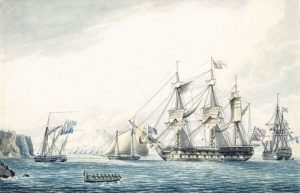William Clarke
1755-1801.
Clarke was commissioned lieutenant on 28 May 1778 and posted captain on 7 July 1782. Having joined the Eagle 64 in 1783 he commanded her at the Battle of Cuddalore on 20 June where she suffered casualties of four men killed and eight wounded. He remained in the East Indies station after the peace before returning with her to England in January 1786 when she was paid off.

At the start of the French Revolutionary War in 1793 Captain Clark commanded the Argo, here depicted several years later at Gibraltar
In May 1793 he commissioned the Argo 44 on the North Sea station. He brought home an East India convoy from St. Helena to Portsmouth in the late summer of 1794 in company with the Lion 64, Captain Erasmus Gower, and Sampson 64, Captain Robert Montagu, whereupon he immediately sailed with a convoy for the Downs and then transferred to the Baltic to bring home the trade. He left the Argo during the following winter.
Although appointed to the Sampson 64 in early 1795 Clarke commanded her for but a short while before he succeeded Captain John Brown on the Victorious 74 in Vice-Admiral Sir George Keith Elphinstone’s expedition bound for the Cape. His ship was present when this force took the Dutch colony on 16 September 1795, and she subsequently sailed to join Rear-Admiral Peter Rainier’s fleet in the East Indies.
On 8 September 1796, being in company with the Arrogant 74, Captain Richard Lucas, the Victorious fell in with Rear-Admiral Pierre César Charles Guillaume Sercey’s squadron of six frigates off Sumatra, which squadron had departed Europe in March. A bloody action ensued, and although the British ships were outmanoeuvred on the following day the French withdrew in order to protect their ships for the purpose of raiding commerce. Clarke received a bad wound to his thigh during the action and had to leave the deck, being one of seventeen men killed and fifty-six wounded.
On 30 June 1798 Lieutenant Nesbit Josiah Willoughby was arrested for disrespectful behaviour towards Clarke aboard the Victorious, but after being suspended from duty his punishment was quashed. Nevertheless, he refused to return to duty until his original misdemeanour was expunged, and when this was refused he applied for a court martial. This was held twelve months later, and Willoughby was dismissed the ship.
Clarke still commanded the Victorious at the Cape and in the East Indies in 1800, but was reported to have died on about 8 December 1801, having departed Madras with a convoy several weeks earlier in command of the Suffolk 74.
His son William entered the Navy.
